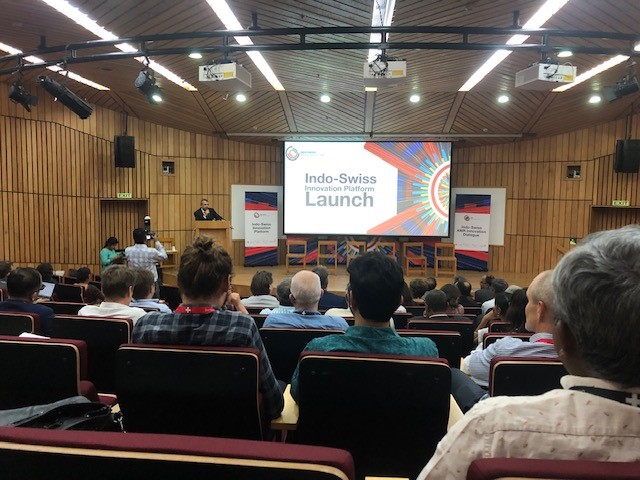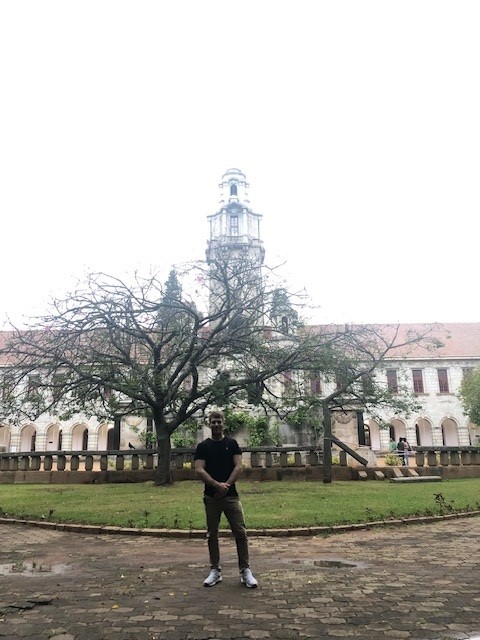A look across the street to where the rickshaw driver beckons me over. Jaywalking in Bangalore is a common sight – at least among the locals. Should I? Soon after, I find myself floating away through the clamor and colors of the streets of Bangalore. The surrounding traffic is startling: outwardly chaotic, yet surprisingly efficient, as if following some internal principle, articulated in the language of the horns.
I had the opportunity to participate in the Swissnex staff mobility program in Bangalore and Delhi. The goal: to learn more about Open Science practices in India and their implications for the Indian society. It was an apt time to do so. After all, Indo-Swiss relations are flourishing on all fronts. The launch of an Indo-Swiss innovation platform, fleshed out by the Swiss general consulate in Bangalore (a city dubbed an “innovation hub”) promises to scale collaborations in both industry and academia by providing a robust framework for spin-offs and startups. A mere three months later, in January 2024, free trade agreement talks between the EFTA states and India entered a final stage after years of negotiation. Against the backdrop of current geopolitical shifts and tensions, expanded relations with an emerging economy that seeks to navigate a policy of non-alignment – to some – might appear as a good sign. It’s about building bridges, rather than tearing them down. Open Science, as a project inherently geared toward scientific collaboration and border-crossing knowledge production, in some sense resonates with this optimism.

Accordingly, I awaited my stay in India with anticipation. The Swissnex India staff did a marvelous job – many thanks to them! My contact person, Prajwala, proved extremely helpful in all aspects concerning my stay. Thanks to her commitment and dedication, I was connected with some of the most critical stakeholders related to Open Science, enabling me to exchange experiences and perspectives with researchers, legal experts, and federal policymakers.
Open Science in India
With an academic system oriented to the west, India’s discourse around Open Science prima facie assumes a similar form as is the case with Europe. The formulation of goals, challenges, concerns, and even some of the strategies to upscale sharing and access to knowledge appear familiar in broad strokes.
Nonetheless, there are some decisive differences. For instance, it is notable that researchers’ attitudes and practices regarding sharing and re-using scientific material differ from what we are used to in Europe. Reliance on, and exploitation of openly accessible data appear more of a commonplace in India, while at the same time, sharing data is yet less practiced. At first glance, this comes as no surprise. It fits in with the Global North – Global South narrative, feeding on the notion that it is primarily the dearth of funding and infrastructure that hampers the sharing of scientific material; or conversely, that the limited means to collect data dictates the need to exploit what is openly accessible. However, the reluctance to openly share scientific material extends to article publications. The cause, no doubt, is manifold. Article processing charges (APCs) may account for it to some degree, but the reluctance to self-archive hints at other reasons. Given this situation, it is little surprising that the value of making scientific output openly accessible in India is primarily pinpointed in transparency rather than re-use. Whereas the latter appears to be an established practice, several incidents of retraction have called for the former.

But let’s zoom out a bit. One could argue that the reluctance to share, at least partially, stems from generally lax attitudes toward intellectual property, along with consequent concerns about infringement, and the desire to retain control over one’s own output – in short, a different culture. Being a big regional and an aspiring global power, India is acutely aware and responsive to security concerns. It thinks and acts in long-term perspectives and contingencies – a circumstance reflected in a policy that favors a national rather than extraterritorial infrastructure solution for an Open Research Data ecosystem. Furthermore, questions regarding ownership and protection of data become even more relevant when it comes to India’s indigenous communities.
Citizen Science and Indigenous Knowledge Systems
It is somewhat of a truism that Open Science aims to go beyond merely unlocking scholarship to the public. Thus, to warrant epistemic plurality, it is crucial that the dissemination of scientific output is not monopolized by any global region or socio-economic class. As a multi-lingual subcontinent with a colonial past, a multitude of ethnicities, beliefs, and traditions, as well as facing the challenge of social inequalities, India is particularly attuned to this point. Accordingly, the Indian Open Science movement is intimately interwoven with concepts like citizen science and epistemic justice. Its vision: the empowerment of citizens to participatory research. India addresses these topics by mapping, nurturing, and promoting the scientific participation of indigenous knowledge in areas such as environment, agriculture, technology or medicine.
The call for a more inclusive science negotiates the interests of diverse governmental, academic, and non-governmental stakeholders. One thing is certain: the initiative of retrieving and integrating so-called IKS (Indian Knowledge Systems) into scientific institutions and society is a manifestly political one. While, to the outside, it stands as a move to challenge western epistemic hegemony, it domestically promises to serve as an instrument of national integration. However, as such, it might harbor just the same pitfalls of monopolies in accommodating indigenous knowledge in a scientific or societal context on a domestic level. Descent, religious faith, economic means, gender, and rural vs. urban residence factor into the agency of different groups. While many of these aspects are addressed with activities geared toward more equality, others fall short. Under the ruling Bharatiya Janta Party (BJP), Hindi contributions to citizen science are more likely to be popularized than, for example, those of the Muslim minority; Vedic traditions are more likely to derive “valid knowledge” as compared to non-canonical works or oral transmission. In short, the domestic political landscape predetermines the scope and delimitation of the concept “inclusiveness”.
Politics aside. As different as the two nations are, India and Switzerland have some common challenges when it comes to the translation of science into society. The federal structure with a multi-tiered legal system and many HEIs administered on a state/cantonal level on the one hand, multilingualism (although of a vastly different scale) on the other. Making science accessible to laymen and society not only requires an accessible language but also publications in vernacular tongues. It is here, ZHAW as a university of applied sciences is strongly positioned due to a high publication output across a wide range of professional journals in national languages and the ongoing endeavors to facilitate their self-archiving. Switzerland and India surely can learn much from each other. It is hoped that collaborations will be advanced not only in scientific work itself but also in improving and fortifying the complex fabric of knowledge circulation among society, citizen science, academia, and world regions.
Ein Beitrag von Simon van Rekum
Titelbild: Agra India skyline silhouette with panorama at white background Vector Illustration Business travel and tourism concept with modern buildings Image for banner or website von Sky and Glass unter Freepik-Lizenz, Zuschnitt ZHAW
 | Wo nicht anders genannt, steht dieses Werk unter Lizenz CC BY 4.0 ZHAW, Hochschulbibliothek (Stand 19.03.24). |
